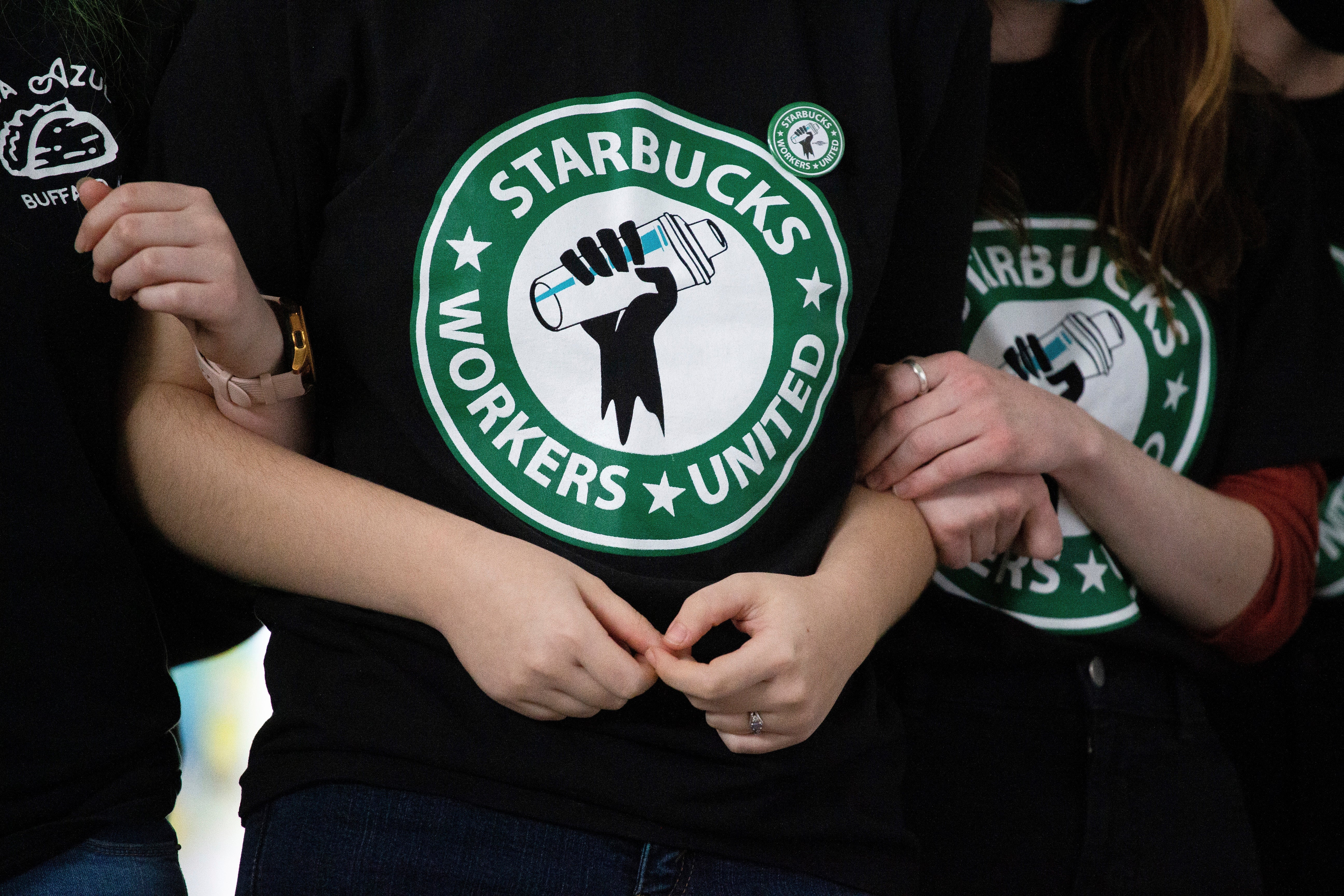Starbucks takes on the federal labor agency before the US Supreme Court
The U.S. Supreme Court is set to hear oral arguments in a case filed by Starbucks against the National Labor Relations Board

Your support helps us to tell the story
From reproductive rights to climate change to Big Tech, The Independent is on the ground when the story is developing. Whether it's investigating the financials of Elon Musk's pro-Trump PAC or producing our latest documentary, 'The A Word', which shines a light on the American women fighting for reproductive rights, we know how important it is to parse out the facts from the messaging.
At such a critical moment in US history, we need reporters on the ground. Your donation allows us to keep sending journalists to speak to both sides of the story.
The Independent is trusted by Americans across the entire political spectrum. And unlike many other quality news outlets, we choose not to lock Americans out of our reporting and analysis with paywalls. We believe quality journalism should be available to everyone, paid for by those who can afford it.
Your support makes all the difference.After Starbucks fired seven workers who were trying to unionize their Tennessee store, a U.S. government agency obtained a court order forcing the company to rehire them. Now, Starbucks wants the Supreme Court to curb the government’s power in such cases.
On Tuesday, justices are scheduled to hear Starbucks’ case against the National Labor Relations Board, the federal agency that protects the right of employees to organize. If the court sides with Starbucks, it could make it tougher for the NLRB to step in when it alleges corporate interference in unionization efforts.
The hearing comes even as the animosity between Starbucks and Workers United, the union organizing its workers, has begun to fade. The two sides announced in February that they would restart talks with the aim of reaching contract agreements this year. Starbucks and union representatives planned to meet Tuesday for their first bargaining session in nearly a year.
Workers at 420 company-owned U.S. Starbucks stores have voted to unionize since late 2021, but none of those stores has secured a labor agreement with Starbucks.
The case before the Supreme Court began in February 2022, when Starbucks fired seven employees who were leading a unionization effort in Memphis, Tennessee. Starbucks argued the employees had violated policy by reopening the store after closing time and inviting non-employees — including a television news crew — to come inside.
The National Labor Relations Board determined the firings constituted an illegal interference with workers’ right to organize. The agency found that Starbucks had routinely allowed off-duty employees and non-employees to remain in the store after hours to make drinks or collect belongings.
The NLRB asked a federal district court to intervene and require Starbucks to rehire the workers while the case wound its way through the agency’s administrative proceedings. A district court judge agreed with the NLRB and issued a temporary injunction ordering Starbucks to rehire the workers in August 2022. After the 6th U.S. Circuit Court of Appeals upheld that ruling, Starbucks appealed to the Supreme Court.
Five of the seven workers are still employed at the Memphis store, while the other two remain involved with the organizing effort, according to Workers United. The Memphis store voted to unionize in June 2022.
Starbucks said the Supreme Court should intervene because federal appeals courts don't agree on the standards the NLRB must meet when it requests a temporary injunction against a company. Starbucks says temporary injunctions can be a major burden for companies, since the NLRB's administrative process can take years.
Since 1947, the National Labor Relations Act — the law that governs the agency — has allowed courts to grant temporary injunctions requested by the NLRB if it finds them “just and proper.” In its review of what transpired at the Starbucks store in Memphis, the Sixth Circuit required the NLRB to establish two things: that it had reasonable cause to believe unfair labor practices occurred and that a restraining order would be a “just and proper” solution.
But other federal appeals courts have required the NLRB to meet a four-factor test when seeking restraining orders, including showing it was likely to prevail in the administrative case and employees would suffer irreparable harm without an injunction.
Starbucks has asked the Supreme Court to establish the four-factor test as the standard all courts must follow when considering NLRB injunction cases.
“This court’s intervention is urgently needed,” Starbucks wrote in an October court filing. “National employers like Starbucks must defend themselves against years-long injunctions under materially different tests depending on where alleged unfair labor practices occur or where employers reside.”
The NLRB says it already considers its likelihood of success before taking a case to court, making whether courts apply two factors or four largely irrelevant. The agency notes that it rarely asks courts for temporary injunctions; in its 2023 fiscal year, it received 19,869 charges of unfair labor practices and authorized the filing of 14 cases seeking temporary injunctions.
“The two-part inquiry undertaken by the Sixth Circuit and other courts ... subjects board petitions to meaningful scrutiny, and does not call for courts merely to ‘rubber-stamp’ agency requests,” the NLRB argued in a filing last month.
___
Durbin reported from Detroit.